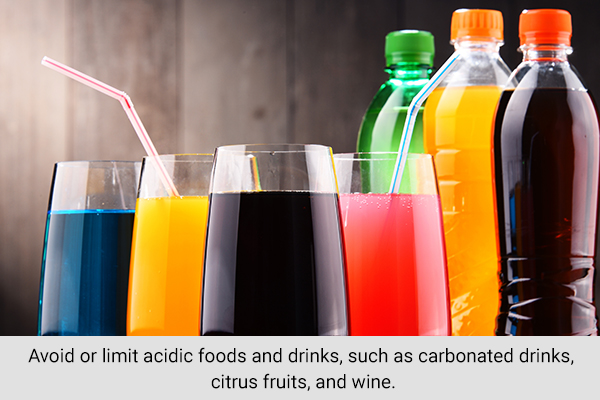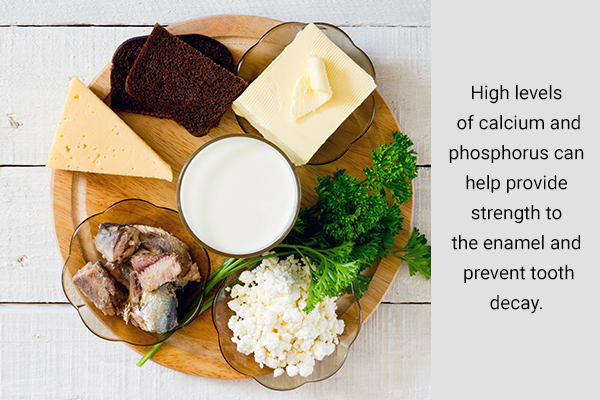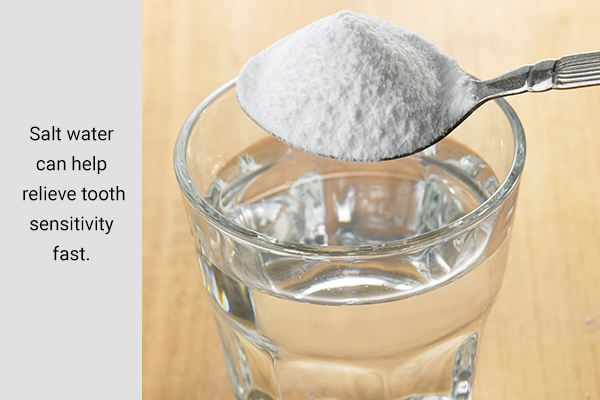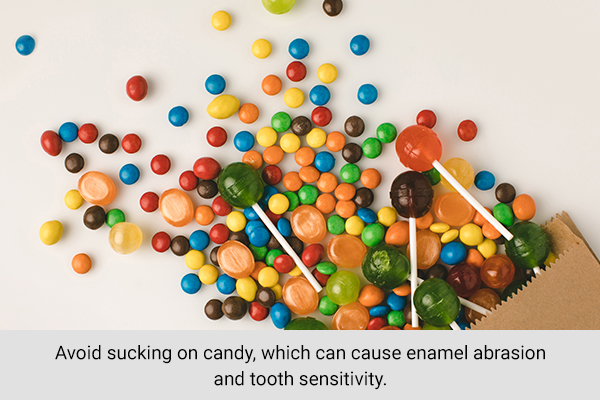In this article:
The idea of a hot soup in the winter months or a chilled ice-cream in the summer might be a tempting one, but not for people with tooth sensitivity. Tooth sensitivity is a common dental problem for at least 40 million Americans. Women are 1.8 times more likely to experience tooth sensitivity than men.

The roots of your teeth contain thousands of tiny tubules (channels) leading to the pulp, the tooth’s nerve center. These tiny tubes are located in the dentin, the layer of tissue found beneath the hard enamel that contains the inner pulp.
Tooth sensitivity occurs as a result of wearing out of the enamel and “cementum” or receding gums, which expose the tiny tube surfaces that lead to the nerves in the teeth.
Once these tiny tubes are open to the external environment, the movement of fluids within these tubules reaching up to the nerves in your tooth can elicit a response. The outcome being nerve irritation and pain as the hot or cold foods and drinks travel through the tubes and touch the nerves.
Eating or drinking hot or cold foods or beverages, touching your teeth, or exposing them to cold air can act as a stimulus to irritate the nerves in the teeth. Sometimes, sweet foods and drinks can trigger sensitivity pain. (1)
Also, tooth sensitivity may be caused by chipping off of the enamel from the teeth due to the presence of acids in the mouth. This process is called erosion. The intrinsic cause could be acid reflex or bulimia, and extrinsic causes may include acidic foods and beverages.
Natural Ways to Tend to a Sensitive Tooth
Here are some tips to reduce tooth sensitivity and the associated pain:
1. Limit consumption of acidic foods

Frequent consumption of foods and drinks with a high acid content can dissolve the tooth enamel, leading to dentin exposure.
Use the following tips to reduce enamel erosion and tooth sensitivity caused by acidic foods and beverages:
- Avoid brushing your teeth right after eating or drinking acidic substances as it can damage the tooth enamel. Wait for 30 minutes before brushing your teeth.
- Learn the correct method of brushing from a dentist/hygienist. Avoid hard brushing and avoid using a hard/medium-bristled toothbrush.
- Avoid or limit acidic foods and drinks, such as carbonated drinks, citrus fruits, and wine.
- After eating or drinking an acidic food or beverage, drink water to balance the acid levels in your mouth. It is recommended to use a straw when drinking acidic beverages to reduce exposure to teeth. Avoid swishing for long periods.
2. Maintain oral hygiene
Maintaining good oral hygiene helps prevent inflamed and sore gum tissue, cracked teeth, and plaque buildup on the root surfaces that cause tooth sensitivity.
- It is essential to clean your teeth, mouth, gums, and tongue thoroughly by following proper brushing and flossing techniques.
- Brush your teeth gently using a soft-bristled toothbrush twice daily. Do not use a medium/hard-bristled toothbrush.
- Use a dentist-approved desensitizing toothpaste to help reduce the sensitivity. The ingredients in this type of toothpaste work by filling the tubules in the dentin.
- Avoid using tartar-control toothpaste.
- Floss between your teeth twice daily.
- Use a mouthwash and toothpaste containing fluoride of at least 1350 parts per million. This will help prevent the growth of bacteria and, in turn, tooth decay.
3. Enrich your diet with essential nutrients

Several minerals are essential in promoting the sound functioning and health of the human body. Bones and teeth require sufficient levels of calcium, magnesium, and phosphorus.
High levels of calcium and phosphorus can help provide strength to the enamel and prevent tooth decay. However, high levels of calcium can inadvertently switch off the activation of the magnesium-dependent hormone thyrocalcitonin, which directs the flow of calcium to the bones.
The calcium thus displaced in the absence of sufficient magnesium does not reach the destined bones and tissues and can affect the body adversely. To ensure the uptake of calcium and phosphorus, it is necessary to maintain the presence of magnesium in balanced amounts.
According to a study conducted in 2016 published in the International Journal of Nanomedicine, the deposition of minerals is an important aspect in treating diseases related to the process and the development of the different layers of teeth. (2)
Vitamin D is crucial for the absorption of calcium and phosphorus. Hence, this vitamin is also required for the growth, repair, and development process of the bones and teeth.
It also plays a role in maintaining the structure of the teeth and reducing inflammation in the gums, a characteristic feature of periodontal diseases.
- Try to eat a considerable portion of cheese, yogurt, oranges, beans, broccoli, and salmon to get calcium from your diet.
- Expose yourself to 15 minutes of sunlight every day to promote the synthesis of vitamin D. You can also consider eating eggs and fatty fish to get a dose of vitamin D.
- Include cereals, wheat germ, soybeans, nuts, citrus fruits, and poultry in your diet to maintain your phosphorus levels.
Note: Consult your doctor for the proper dose if you wish to rely on supplements as an excess of any mineral and vitamin D can have harmful effects on the body.
Several remedies coming down from generations, although not much approved by the doctors, have been used widely by many people as a solution to their health problems.
Listed below are a few remedies that have been upheld by the general public as an effective way to treat sensitive teeth.
4. Rinse with salt water

Salt water can help relieve tooth sensitivity fast. It improves the pH balance of the mouth, thus creating an alkaline environment in which harmful bacteria cannot survive.
It can help reduce dental pain as well as treat gum sores and the side effects of recent dental procedures.
- Mix ½ teaspoon of salt in 1 cup of warm water.
- Rinse your mouth with this salt-water solution.
- If moving it to all parts of your mouth is painful, try holding it for a few minutes.
- Spit the solution out and rinse your mouth with plain water.
- Repeat twice daily until you are satisfied with the result.
5. Gargle with baking soda
Baking soda is a home remedy that is widely used due to its potent antiseptic and antimicrobial properties. Tooth sensitivity can be caused by a decaying tooth; baking soda can help resolve the causative infection, usually one caused by Streptococcus mutans.
Baking soda has a high pH and its alkaline nature can help wipe off the microbial population thriving on the plaque acids on your teeth.
To about ½ cup of warm water, add 2 tablespoons of baking soda. Use this baking soda solution in the following ways:
- Gargle with this solution for almost 1 minute.
- Use this solution to swish around your oral cavities for 45 seconds to 1 minute.
- Place a small washcloth or cotton boll soaked in this baking soda solution onto the infected region.
- Use this solution to gently brush your teeth.
Tooth Sensitivity Vs. Toothache
Toothache occurs when the deep-seated pulp, where the muscles and nerves are present, is irritated. Toothache can develop because of several reasons, tooth sensitivity being one of them. A persistent case of tooth sensitivity can result in a toothache.
While a toothache is an outcome of exposed pulp and roots of the tooth, sensitivity occurs as a response of the dentin to the hot, cold, sweet, or acidic stimulus. However, toothache is associated with various reasons that need to be tended to and treated accordingly.
Causes of Tooth Sensitivity

Sensitivity is commonly triggered by hot, cold, sweet, or acidic foods and drinks. Sometimes, simply breathing with your mouth open is enough to cause pain.
As discussed above, tooth sensitivity is the outcome of the erosion of the enamel and exposure of the dentinal tubules. This can be caused by various reasons, including:
- Tooth decay (cavities)
- A fractured tooth
- Worn-out fillings
- Gum diseases with exposed roots
- Excessive pressure when brushing or using a hard/medium-bristled toothbrush
- Bulimia/acid reflux
- Xerostomia (dry mouth)
- Rubbing lime or lemon on teeth in order to clean them (myth)
- Occupational hazards such as working in battery manufacturing factories
- Receding gums
- Whitening or bleaching products and procedures
- Using chemically harsh oral products
- Consuming a lot of acidic or sweet foods
Standard Treatment for Tooth Sensitivity
You can tame the sensitivity in your teeth by consulting your dentist. Your dentist will most likely prescribe the following to treat your condition: (3)
- Fluoride gel may be prescribed to harden and protect your enamel.
- A desensitizing toothpaste that can act as a barrier to prevent the transmission of signals from the surface of the tooth to the nerves in the pulp region. This is a gradual process that takes time to show results. Desensitizing agents are characterized based on the mode of action. You can use a toothpaste containing potassium salts or fluoride. If at-home products do not help in 2 to 4 weeks, visit your doctor for in-office methods using fluoride varnish, laser, and desensitizing agents.
- A crown, bonding, or inlay may be inserted to avert the decay and cavities that may be the cause of the sensitivity.
- For sensitivity induced by receding gums or a loss of gum tissue, a surgical gum graft may be implanted to protect the exposed roots of the tooth and curtail the sensitivity.
- A root canal is required in cases that are severe and persistent.
Additional Tips to Avoid Tooth Sensitivity

- Teeth grinding may wear down your enamel and expose the dentin. Pay attention during stressful times to see if you are clenching and grinding your teeth. If so, take a few deep breaths to help relax your mouth. If you grind your teeth at night while sleeping, use a mouth guard to protect your teeth.
- Limit the use of tooth-whitening products, as the harsh chemicals they contain can wear away the enamel from your teeth and cause sensitivity.
- Consider taking a second opinion before going for a teeth bleaching procedure.
- Chewing tobacco is no less harmful than smoking cigarettes. It can cause your gums to recede, which is a major cause of tooth sensitivity and decay.
- Avoid sucking on candy, which can cause enamel abrasion and tooth sensitivity.
When to See a Doctor
Consult a dental professional if your condition persists for a few weeks despite the use of home remedies. Overlooking your condition can entail a risk of severe infection or loss of teeth.
Final Word
Fortunately, tooth sensitivity is quite treatable, whatever the cause. However, a visit to the dentist is a must to first diagnose the underlying cause and then treat the condition accordingly.
Plus, you can try the above mentioned tips and remedies to prevent and relieve tooth sensitivity.
- Was this article helpful?
- YES, THANKS!NOT REALLY


